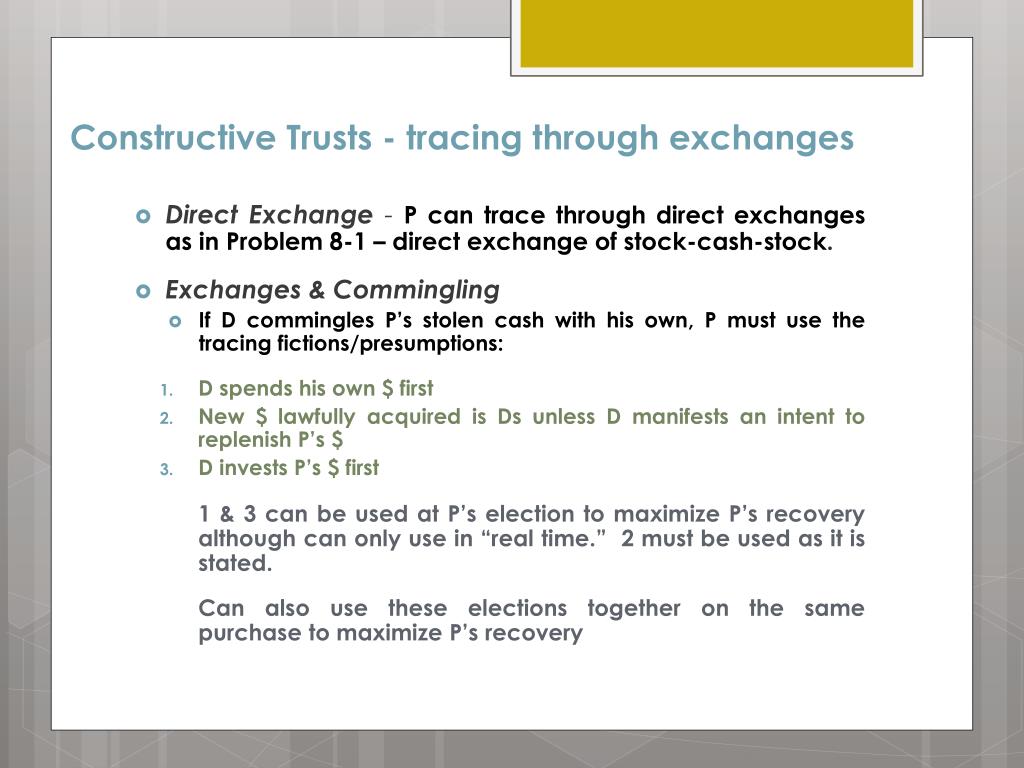Checking out How Does a Positive Depend On Operate In Residential Or Commercial Property and Asset Disputes
The principle of a useful trust serves as an essential system within residential or commercial property and possession disputes, resolving circumstances where one party has unjustly profited at the cost of an additional. By checking out the subtleties of exactly how positive depends on run, one can discover the complexities that frequently emerge in legal contexts.

Definition of Constructive Depend On
A useful trust fund emerges when a court establishes that it is required to avoid unfair enrichment, frequently in circumstances where a celebration has actually gotten building via wrongful means or under scenarios that necessitate equitable relief. This legal solution is not officially developed by the parties included; instead, it is enforced by the court to resolve situations where fairness and justice need treatment.
Constructive counts on are often invoked in situations entailing fraudulence, violation of fiduciary duty, or other forms of misconduct. If a private wrongfully takes ownership of building that truly belongs to an additional, the court might impose a constructive trust to ensure that the offender holds the residential or commercial property for the benefit of the rightful proprietor. This lawful idea runs on the principle that it would be inequitable for the wrongdoer to preserve the advantages originated from their misconduct.
Ultimately, a positive depend on works as a powerful device in building disputes, reinforcing the concept that ownership should mirror not only lawful title yet likewise ethical factors to consider. By acknowledging the need for fair relief, courts make certain that justice prevails in the circulation of residential property and possessions.
Trick Principles of Positive Depends On
While the application of useful trust funds may differ depending upon specific conditions, several vital principles consistently underpin their enforcement in property conflicts. Firstly, the concept of unjust enrichment plays an essential role; a useful trust fund is frequently enforced to avoid one event from unfairly benefiting at the expenditure of another. This concept emphasizes the equitable nature of constructive trusts, highlighting that lawful ownership does not constantly relate to rightful ownership.
Second of all, the need of a fiduciary connection is significant. What Is A Constructive Trust. Useful trusts regularly emerge in contexts where one celebration has a duty to act in the ideal interests of one more, such as in partnerships or joint endeavors. Violations of this duty can set off the charge of a constructive depend protect the aggrieved event's interests
Furthermore, the teaching of objective is crucial, as courts consider whether the parties intended to develop a trust-like partnership, also if not officially recorded. Ultimately, the concept of fair treatments highlights that useful trust funds offer to give alleviation that lines up with fairness and justice, making sure that the rightful plaintiff can gain back residential or commercial property or possessions that they are entitled to, despite legal title residing elsewhere.
Applications in Home Disputes
Positive counts on find considerable application in home disputes, specifically when dealing with concerns of ownership and fair legal rights. These trust funds develop in situations where one party holds building under conditions that, in fairness and justice, ought to profit another celebration. The fair treatment of a positive count on protects against unfair enrichment by recognizing the contributions of an event who, in spite of doing not have formal title, has a reputable claim to the property.
One typical circumstance involves cohabiting companions that add to the procurement or maintenance of residential property but are not on the title action. In such instances, the courts may impose a useful depend reflect the parties' payments and intentions, thus making certain that the non-titled companion receives a you can try these out fair share of the residential property.
In addition, constructive counts on can be critical in disputes involving inheritance or family residential property, where a decedent's intent might not have actually been formally documented. Courts may infer a constructive count on to recognize the decedent's dreams and rectify potential injustices among successors. In general, constructive depends on work as an essential tool in balancing civil liberties and making sure fair outcomes in building disagreements, reinforcing the concept that justness must prevail in ownership matters.
Instance Studies and Examples
Residential property disputes entailing useful depends on can frequently be highlighted via real-life study that highlight the complexities and subtleties of fair rights. One notable instance is * Gissing v. Gissing *, where a better half declared a helpful rate of interest in the family home, saying that her monetary contributions throughout the marriage warranted a positive count on. The court ultimately regulationed in her support, developing that her contributions developed an equitable rate of interest regardless of the home being solely in her husband's name.
One more illustrative situation is * Thompson v. Thompson *, where brother or sisters contested the possession of a household estate after their moms and dads' death. One brother or sister had kept and improved the building, asserting that these activities justified a useful trust. The court identified the sibling's efforts and located that a constructive depend on was necessary to stop unjustified enrichment, therefore granting them a share in the estate.
These instances exemplify exactly how constructive counts on offer to deal with circumstances where lawful ownership does not mirror truth equitable Find Out More rate of interests of the events involved, highlighting the importance of intent and payments in determining rightful insurance claims in residential or commercial property disagreements.
Legal Implications and Considerations
When addressing positive counts on in building disagreements,Countless lawful ramifications and considerations occur. Foremost, the establishment of a positive trust fund typically depends upon the presence of an unjustified enrichment, in which one celebration benefits at the expense of another. This concept necessitates a thorough assessment of the connection between the events and the conditions that caused the alleged injustice.
In addition, courts typically require clear proof of the plaintiff's contribution to the property or property in concern, which can consist of monetary investments, labor, or other kinds of support. The burden of evidence resides the complaintant, requiring meticulous documents and statement to validate their cases.
Furthermore, the timing of cases is important, as laws of limitations might restrict the capacity to establish a positive depend on after a certain duration. Legal counsel has to navigate these time constraints meticulously to make certain that insurance claims are submitted in a prompt way.
Lastly, the capacity for conflicts over the intent behind home transfers can complicate matters better, necessitating a nuanced understanding of both legal law and instance regulation to efficiently support for a customer's passions in constructive count on claims.
Conclusion

The concept of a useful depend on offers as a vital mechanism within home and possession disagreements, resolving situations where one party has unfairly benefited at the cost of one more. If a private wrongfully takes property of property that rightfully belongs to another, the court may impose a constructive count on to make sure that the crook holds the home for the benefit of the rightful owner.Useful depends on locate considerable application in building disagreements, specifically when resolving concerns of possession and equitable civil liberties. Overall, positive counts on serve as an important tool in harmonizing civil liberties and making certain fair results in residential property disagreements, enhancing the principle that fairness have to dominate in ownership issues.
In recap, useful trusts offer as crucial equitable solutions in building and possession disputes, addressing unfair enrichment by recognizing the payments of parties entailed. - What Is A Constructive Trust